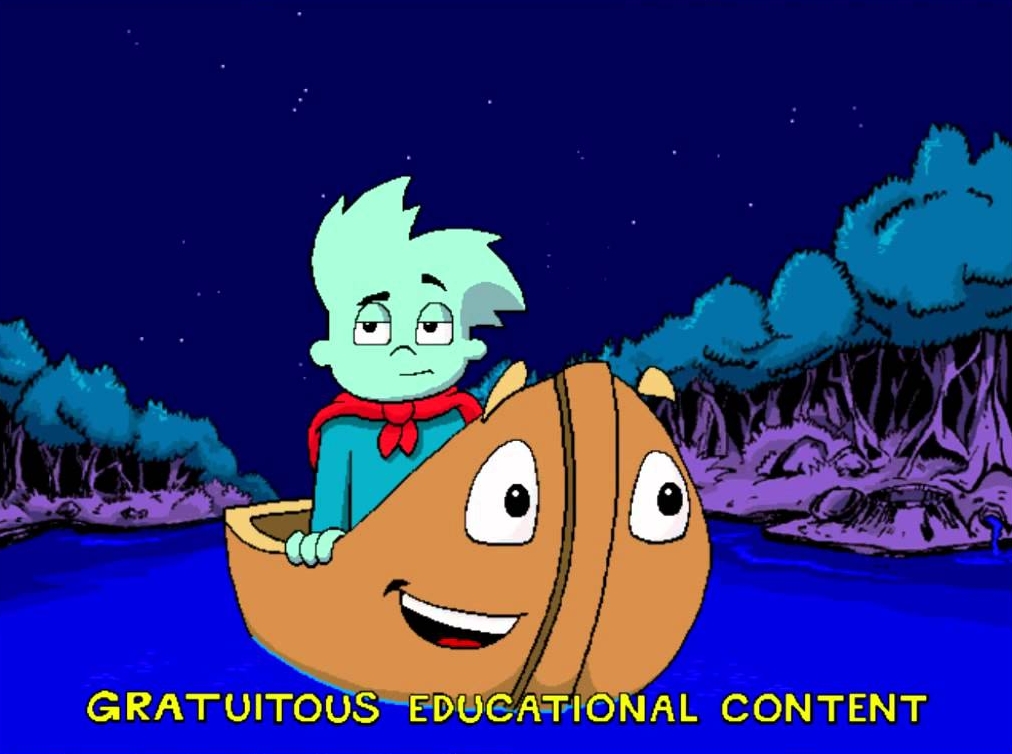Oops, I'm Learning!
Pajama Sam in "No Need To Hide When It's Dark Outside"
Video games oftentimes get a bad rap when it comes to their educational value. Generally speaking, when people think about video games they don’t think about their educational value at all, and if they do, usually only children’s games akin to Jumpstart, Math Blasters, or Pajama Sam are brought to mind. Few people really consider the educational value found in other games, and so I wanted to set the record straight. Games can be fun, action-packed, and mindlessly entertaining, but they can also teach us about all kinds of different things without making us feel like we’re trapped in a class with that annoying teacher from Charles Schulz’s Peanuts.
Here are just a few examples of games that have surprisingly high educational value. Some of these games hide their educational value well, while others seem to have a focus on cerebral qualities built into their design. Regardless, these are games that probably aren’t discussed as educational games, but will make you a bit smarter for having played them.
Gran Turismo Sport
As the most realistic driving simulator ever, it’s not too much of a surprise to say that Gran Turismo Sport, the most recent addition to the celebrated Gran Turismo franchise, can teach players a lot about driving. Gran Turismo Sport even takes things a step further by requiring players to pass driving tests and learn the physics behind racing before being allowed access to certain content. Each lesson is even accompanied by video lectures complete with visual diagrams showing air flow and elaborating on what makes certain driving techniques more effective than others.
Where Gran Turismo Sport surprised me most in regards to its educational value, however, was something I wasn’t expecting to be in a car game: historical timelines. Within the game, there’s a feature where you can view individual curated museums for automobile manufacturers that show a timeline of the different automotive innovations, products, and events related to that specific manufacturer. But, in addition to that, those individual bits of information are contextualized with various other historical events on a grand timeline spanning thousands of years!
The history of film, architectural achievement, the invention of the ipod, and much more is shown in this grand timeline. I’ve admittedly spent hours just sifting through the overwhelming amount of information, and it’s fascinating! Everything from the first truck to ever exist (1896) to the inauguration of President Trump (2017) is shown here, and it’s a surprising joy to explore it all.
Everything
Everything is a strange game. Everything is a game in which the player can play as anything and everything in the entire universe, including the universe itself. The entire game is a sort of meditation on how big and how small the universe is, and our respective place within it, as well as the interconnectivity of everything on an atomic as well as metaphysical level. The entire experience is narrated by Alan Watts (using bits from his various lectures).
The argument can be made that the philosophy of Alan Watts is more spiritual than scientific, but eastern philosophy aside, the game acts as an interactive encyclopedia of… well, EVERYTHING! Pulling information from wikipedia, the game allows players to read and learn about anything and everything in the universe. As you explore the universe, you unlock information about each and every ‘thing’ you become, and that’s pretty all encompassing. You can learn about mitochondria, the world oceans, various plants and animals, the composition of human hair, the difference between a violin and a viola, nebulas, and much much more! What’s great about Everything is that the game has a gloriously derpy sense of humor too, so as you’re wandering about the universe learning bits about everything, you’re also probably smiling cheekily without even thinking about the fact that you’re learning so much.
Metal Gear Solid: Peacewalker
Metal Gear Solid has always tread this line between intellectual and conspiracy, and Metal Gear Solid: Peacewalker is no different, but where Peacewalker differs is how willingly it dives into talking about so many different things in a way that makes sense within the story without sounding too heavy handed or ridiculous.
Throughout the game, you can unlock audio conversations between the cast of characters. Each character has a specific expertise and they’re more than willing to discuss their intellectual interests with the main character. These conversations play out like a scripted TED talk featuring your favorite characters with a few comedic moments and dramatic story reveals littered throughout.
What makes these conversations so fascinating is that the characters often shout out their sources for the information they discuss. Various movies, documentaries, books, scientists, and famous studies are referenced in the game, and the characters are adamant that the player check them out and learn more. My favorite character in Peacewalker, the appropriately named “Dr. Strangelove”, has a lot to say about the human brain and differences between genders. I found what she had to say to be fascinating, and she encouraged me to look into Alan Turing and his various works. That’s not all though, as the other characters taught me about topics including geography, French language and cuisine, various bird species, foreign politics, nuclear deterrence theory, artificial intelligence, and much more!
Puppeteer
Puppeteer is a clever game designed to be enjoyed by parents and children together. It’s a quirky, and sadly overlooked, single player or co-op platformer full of charm and hilarious parodies of childhood stories and pop culture entertainment. The game is even specifically designed with children with ADHD in mind, as the director of the game was sure to have something new happening on screen at least every 10 seconds throughout the entire game so kids were less likely to get bored. Where the game gets especially clever is in its fun and plentiful bonus levels
Many bonus level were designed to teach the player about various things. The game runs the gamut of locations and subject matter, and the bonus levels reflect that by teaching about relevant topics through hilariously written dialogue throughout, but many of the bonus levels take the cake on their educational value. While trapped in the desert, I learned about the process of mummification, its cultural significance, and how to prepare a corpse for such a thing. While in a Nightmare-Before-Christmas-inspired Christmas Town, I learned about the history of gingerbread men, and how to bake the perfect gingerbread cookie!
(Also, please play this game. It’s seriously an overlooked gem of a game full of superb artistic direction, brilliant writing, and some of the best boss fights I’ve ever played.)
Zero Escape: Virtue’s Last Reward
Part interactive novel and part puzzle game, Zero Escape: Virtue’s Last Reward is a science-fiction thriller full of surprisingly useful tidbits. Locked in a mysterious facility and forced to play a twisted game in order to have any hope of escaping, Zero Escape is packed with thought provoking “escape room” style puzzles.
As the game progresses, players are taught and then required to demonstrate an understanding of various mathematical and scientific principles and philosophies. Schrodinger's cat, probability, The Chinese Room, Other Worlds Theory, and so much more are discussed within the game. Without spoiling too much, Zero Escape is a surprisingly thoughtful game that has a tendency to challenge our gut-reaction understandings of the world around us, and the game challenges those understandings through clever writing and mind-bending puzzles.
The Witness
The Witness doesn’t seem like much. It’s a puzzle game that involves exploring an island and completing various maze puzzles… until it becomes much more. Littered throughout this meticulously crafted game are various audio quotes from authors, scientists, and philosophers all offering conflicting worldviews and often inspiring more questions than answers. Juxtaposed against these bits of audio is a surprising abundance of puzzles that seem to either compliment or challenge the ideas presented. The game gradually becomes a tour de force demonstrating the importance of challenging one's beliefs and updating one’s perspective amongst a world of contradictions and few straight answers.
To put it simply; The Witness is a game that teaches you how to learn. It is because of this that The Witness is arguably the most important game on this list.
Each of these games don’t present themselves as educational experiences, and yet they offer a surprising amount of information regarding a breadth of topics. If you’re interested in a more enlightening gaming experience (that’s also a lot of fun!) then these are my recommendations.
What games have you played that have surprised you with an unexpected educational value? Share your educational gaming experiences in the comments below or join the conversation on twitter @mtfproduction !



















